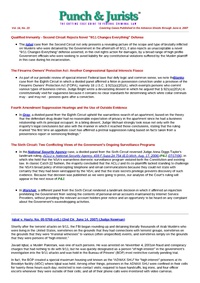Loaded on
June 1, 2007
published in Punch and Jurists
June 04, 2007
As a result of complaints about drug activity, the police went to Joshua Gray's apartment in Huntington, WV to conduct a "knock and talk." The officers did not apply for a search warrant “because they knew their limited information did not amount to probable cause.” However, when Gray came …
Loaded on
June 1, 2007
published in Punch and Jurists
June 04, 2007
Ordinarily, it is unlawful for anyone "who has been convicted in any court of, a crime publishable by imprisonment for a term exceeding one year" to possess a firearm or ammunition. (See, 18 U.S.C. § 922(g)(1)). That law, however, is filled with all kinds of special exemptions, many of …
Loaded on
June 1, 2007
published in Punch and Jurists
June 04, 2007
Shortly after the terrorist attacks on 9/11, the FBI began rounding up and detaining literally thousands of Arab Muslims who were living in the United States, sometimes on the grounds that they had connections with terrorist groups, sometimes on the grounds that they were “material witnesses” to various (often …
Loaded on
June 1, 2007
published in Punch and Jurists
June 04, 2007
The first two paragraphs of this decision by Judge Gertner explain why she rejected, as unacceptable, a four-year delay by the U.S. Citizenship and Immigration Service in acting on an application for adjustment of status to permanent residency.
“This is an action to compel the United States Citizenship and …
Loaded on
June 1, 2007
published in Punch and Jurists
June 04, 2007
Here Judge Horby used the express statutory authority of 7 U.S.C. § 2024(b)(2) to suspend the sentence of a defendant convicted of food stamp fraud, and he noted that § 2024(b)(2) was "an exceptional statutory provision".
In writing this Sentencing Memorandum, Judge Hornby noted that this was a …
Loaded on
June 1, 2007
published in Punch and Jurists
June 04, 2007
In this case, a panel from the Sixth Circuit examined a common eavesdropping program used by the Government involving the secret interception of a person’s emails that are stored on the servers maintained by that person’s Internet Service Provider (ISP).
In 2005, the Government commenced a criminal investigation of …
Loaded on
June 1, 2007
published in Punch and Jurists
June 04, 2007
Habeas petition under 28 U.S.C. section 2241 challenging final order of removal, and filed more than a year after section 106 of the REAL ID Act of 2005 foreclosed the use of habeas corpus to review removal orders, is dismissed as: 1) transfer to the court of appeals was …
